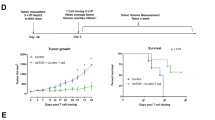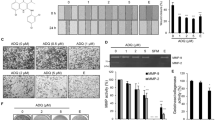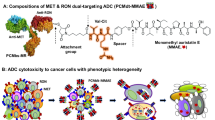Abstract
Emerging evidence demonstrates that a c-Met antibody-drug conjugate (ADC) has superior efficacy and safety profiles compared with those of currently available small molecules or antibody inhibitors for the treatment of c-Met-overexpressing cancers. Here we described both the in vitro and in vivo efficacies of SHR-A1403, a novel c-Met ADC composed of a humanized IgG2 monoclonal antibody against c-Met conjugated to a novel cytotoxic microtubule inhibitor. SHR-A1403 showed high affinity to c-Met proteins derived from human or monkey and potent inhibitory effects in cancer cell lines with high c-Met protein expression. In mice bearing tumors derived from cancer cell lines or patient HCC tissues with confirmed c-Met overexpression, SHR-A1403 showed excellent anti-tumor efficacy. Antibody binding with c-Met contributed to SHR-A1403 endocytosis; the subsequent translocation to lysosomes and cytotoxicity of the released toxin are speculated to be predominant mechanisms underlying the anti-tumor activity of SHR-A1403. In conclusion, SHR-A1403 showed significant anti-tumor activity in cancer cell lines, xenograft mouse models and an HCC PDX model, which all have high c-Met levels. These data provide references for SHR-A1403 as a potential therapy for the treatment of cancers with c-Met overexpression.
Similar content being viewed by others
Log in or create a free account to read this content
Gain free access to this article, as well as selected content from this journal and more on nature.com
or
References
Mo HN, Liu P, Targeting MET. in cancer therapy. Chronic Dis Transl Med. 2017;3:148–53.
Zhang Y, Xia M, Jin K, Wang S, Wei H, Fan C, et al. Function of the c-Met receptor tyrosine kinase in carcinogenesis and associated therapeutic opportunities. Mol Cancer. 2018;17:45–58.
Gow CH, Hsieh MS, Wu SG, Shih JY. A comprehensive analysis of clinical outcomes in lung cancer patients harboring a MET exon 14 skipping mutation compared to other driver mutations in an East Asian population. Lung Cancer. 2017;103:82–9.
Bahrami A, Shahidsales S, Khazaei M, Ghayour-Mobarhan M, Maftouh M, Hassanian SM, et al. C-Met as a potential target for the treatment of gastrointestinal cancer: Current status and future perspectives. J Cell Physiol. 2017;232:2657–73.
Granito A, Guidetti E, Gramantieri L. c-MET receptor tyrosine kinase as a molecular target in advanced hepatocellular carcinoma. J Hepatocell Carcinoma. 2015;2:29–38.
Lee D, Sung ES, Ahn JH, An S, Huh J, You WK. Development of antibody-based c-Met inhibitors for targeted cancer therapy. Immunotargets Ther. 2015;4:35–44.
Parikh PK, Ghate MD. Recent advances in the discovery of small molecule c-Met Kinase inhibitors. Eur J Med Chem. 2018;143:1103–8.
Grullich C. Cabozantinib: a MET, RET, and VEGFR2 tyrosine kinase inhibitor. Recent Results Cancer Res. 2014;201:207–14.
Heigener DF, Reck M. Crizotinib. Recent Results Cancer Res. 2014;201:197–205.
Best J, Schotten C, Lohmann G, Gerken G, Dechene A. Tivantinib for the treatment of hepatocellular carcinoma. Expert Opin Pharmacother. 2017;18:727–33.
Gavine PR, Ren Y, Han L, Lv J, Fan S, Zhang W, et al. Volitinib, a potent and highly selective c-Met inhibitor, effectively blocks c-Met signaling and growth in c-MET amplified gastric cancer patient-derived tumor xenograft models. Mol Oncol. 2015;9:323–33.
Bauer TM, Schuler M, Berardi R, Lim WT, Van Geel R, De Jonge M, et al. MINI01.03: phase (Ph) I study of the safety and efficacy of the cMET Inhibitor Capmatinib (INC280) in Patients with Advanced cMET+ NSCLC: topic: medical oncology. J Thorac Oncol. 2016;11:S257–8.
Pietronave S, Forte G, Locarno D, Merlin S, Zamperone A, Nicotra G, et al. Agonist monoclonal antibodies against HGF receptor protect cardiac muscle cells from apoptosis. Am J Physiol Heart Circ Physiol. 2010;298:H1155–65.
Jin H, Yang R, Zheng Z, Romero M, Ross J, Bou-Reslan H, et al. MetMAb, the one-armed 5D5 anti-c-Met antibody, inhibits orthotopic pancreatic tumor growth and improves survival. Cancer Res. 2008;68:4360–8.
Jun HT, Sun J, Rex K, Radinsky R, Kendall R, Coxon A, et al. AMG 102, a fully human anti-hepatocyte growth factor/scatter factor neutralizing antibody, enhances the efficacy of temozolomide or docetaxel in U-87 MG cells and xenografts. Clin Cancer Res. 2007;13:6735–42.
Garber K. MET inhibitors start on road to recovery. Nat Rev Drug Discov. 2014;13:563–5.
Sheridan C. Genentech to salvage anti-MET antibody with subgroup analysis. Nat Biotechnol. 2014;32:399–400.
Dan N, Setua S, Kashyap VK, Khan S, Jaggi M, Yallapu MM, et al. Antibody-drug conjugates for cancer therapy: chemistry to clinical implications. Pharm (Basel). 2018;11:32–53.
Strickler JH, Nemunaitis JJ, Weekes CD, Ramanathan RK, Angevin E, Morgensztern D, et al. Phase 1, open-label, dose-escalation and expansion study of ABBV-399, an antibody drug conjugate (ADC) targeting c-Met, in patients (pts) with advanced solid tumors. J Clin Oncol. 2016;34:2510.
Wang J, Anderson MG, Oleksijew A, Vaidya KS, Boghaert ER, Tucker L, et al. ABBV-399, a c-Met antibody-drug conjugate that targets both MET-amplified and c-Met-overexpressing tumors, irrespective of MET pathway dependence. Clin Cancer Res. 2017;23:992–1000.
Wang J, Goetsch L, Tucker L, Zhang Q, Gonzalez A, Vaidya KS, et al. Anti-c-Met monoclonal antibody ABT-700 breaks oncogene addiction in tumors with MET amplification. BMC Cancer. 2016;16:105–18.
Di Renzo MF, Narsimhan RP, Olivero M, Bretti S, Giordano S, Medico E, et al. Expression of the Met/HGF receptor in normal and neoplastic human tissues. Oncogene. 1991;6:1997–2003.
Chalouni C, Doll S. Fate of antibody-drug conjugates in cancer cells. J Exp Clin Cancer Res. 2018;37:20–31.
Kalim M, Chen J, Wang S, Lin C, Ullah S, Liang K, et al. Intracellular trafficking of new anticancer therapeutics: antibody-drug conjugates. Drug Des Devel Ther. 2017;11:2265–76.
Xu S. Internalization, trafficking, intracellular processing and actions of antibody-drug conjugates. Pharm Res. 2015;32:3577–83.
Lai Y, Wei X, Lin S, Qin L, Cheng L, Li P. Current status and perspectives of patient-derived xenograft models in cancer research. J Hematol Oncol. 2017;10:106–19.
Williams JA. Using PDX for preclinical cancer drug discovery: the evolving field. J Clin Med. 2018;7:41–53.
Almhanna K, Miron ML, Wright D, Gracian AC, Hubner RA, Van Laethem JL, et al. Phase II study of the antibody-drug conjugate TAK-264 (MLN0264) in patients with metastatic or recurrent adenocarcinoma of the stomach or gastroesophageal junction expressing guanylyl cyclase C. Invest New Drugs. 2017;35:235–41.
Liu JF, Moore KN, Birrer MJ, Berlin S, Matulonis UA, Infante JR, et al. Phase I study of safety and pharmacokinetics of the anti-MUC16 antibody-drug conjugate DMUC5754A in patients with platinum-resistant ovarian cancer or unresectable pancreatic cancer. Ann Oncol. 2016;27:2124–30.
Weekes CD, Lamberts LE, Borad MJ, Voortman J, Mc Williams RR, Diamond JR, et al. Phase I study of DMOT4039A, an antibody-drug conjugate targeting mesothelin, in patients with unresectable pancreatic or platinum-resistant ovarian cancer. Mol Cancer Ther. 2016;15:439–47.
Author contributions
SHG and LGL conceived the project and planned the experiments. CYY and LW designed and participated in all the experiments and wrote the paper. HTQ participated in in vitro experiments. XS and MT analyzed the results. SHG, LGL and LSZ reviewed and edited the manuscript. All authors contributed to and approved the final manuscript.
Author information
Authors and Affiliations
Corresponding author
Rights and permissions
About this article
Cite this article
Yang, Cy., Wang, L., Sun, X. et al. SHR-A1403, a novel c-Met antibody-drug conjugate, exerts encouraging anti-tumor activity in c-Met-overexpressing models. Acta Pharmacol Sin 40, 971–979 (2019). https://doi.org/10.1038/s41401-018-0198-0
Received:
Accepted:
Published:
Version of record:
Issue date:
DOI: https://doi.org/10.1038/s41401-018-0198-0
Keywords
This article is cited by
-
MET (c-Met) protein overexpression is an emerging protein biomarker in non-small cell lung cancer
npj Precision Oncology (2025)
-
Advances in clinical research of MET exon 14 skipping mutations in non-small cell lung cancer
Journal of Cancer Research and Clinical Oncology (2025)
-
SIBP-03, a novel anti-HER3 antibody, exerts antitumor effects and synergizes with EGFR- and HER2-targeted drugs
Acta Pharmacologica Sinica (2024)
-
Antibody–drug conjugates in gastric cancer: from molecular landscape to clinical strategies
Gastric Cancer (2024)
-
Progress of antibody–drug conjugates (ADCs) targeting c-Met in cancer therapy; insights from clinical and preclinical studies
Drug Delivery and Translational Research (2024)



